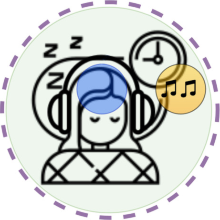How does music affect our sleep? And if music can help to aid sleep, what is the right song for you personally? On Spotify alone, you can choose between thousands of sleep playlists, offering hundreds of thousands of songs. We are conducting data-driven research which aims to develop a deeper understanding of the relationship between sleep behaviour and music/audio, at an individual scale. This work is being conducted in connection to Lullabyte, an EU-funded MSCA doctoral network focused on the interaction between music and sleep. With our contribution, we aim to bridge the gap between other disciplines (neuroscience, psychology, musicology, ...) and our own specialisations (data science, machine learning, signal processing, ...). By making connections between these fields, we hope to develop new approaches to the topic which will lead to novel and beneficial results.
Our research is based on the premise of subconscious preferences towards auditory/musical stimuli during sleep, which are thought to affect the behaviour, and therefore quality, of an individual's sleep. The existence of these preferences has been previously indicated, both by the subjectivity of conscious musical preference and by the variety present within available sleep music. We would therefore like to establish a formal description of the relationship between auditory/musical features and the resultant sleep quality, using personalised models based on contemporary machine learning techniques. Our approach aims for a widespread, general applicability, creating new ways of representing sleep which go beyond the traditional models developed for clinical contexts (e.g. treating insomnia). We also want to test popular conceptions (and misconceptions) regarding sleep music, based on scientific evidence and empirical data rather than the folklore which currently influences many audio-related sleep aids.
We have aggregated a large sleep music dataset consisting of > 100k songs, for extraction of audio and musical features. While the audio cannot be published directly due to copyright constraints, we intend to release the computed features as a dataset, along with a first analysis of the data. Concurrent work is based on directly acquiring polysomnographic (PSG) data during sleep, using this to infer the current sleep state and thereby relating this to audio/music played during sleep. The inference necessitates the development of novel, lightweight systems for sleep state modelling and involves many areas of data science, including real-time signal processing, optimisation and deep learning. This work may be linked to the concepts of personalisation discussed above, towards building new generative models which learn to produce sleep-improving audio tailored to the preferences of the individual. The results produced are intended to be interpretable, promising great relevance to sleep science as a whole.

Dirk Pflüger
Prof. Dr. rer. nat.Head of Institute

Jonathan Stumber
M.Sc.Researcher

Samuel Morgan
M.Sc.Researcher


